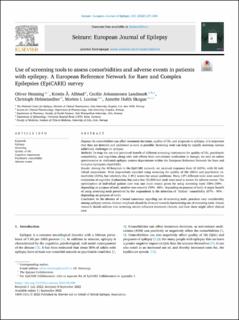Use of screening tools to assess comorbidities and adverse events in patients with epilepsy. A European Reference Network for Rare and Complex Epilepsies (EpiCARE) survey
Henning, Oliver Johannes; Alfstad, Kristin Åshild; Landmark, Cecilie Johannessen; Helmstadter, Cristoph; Lossius, Morten Ingvar; Skogan, Annette Holth
Peer reviewed, Journal article
Published version
Permanent lenke
https://hdl.handle.net/11250/3074255Utgivelsesdato
2022Metadata
Vis full innførselSamlinger
Sammendrag
Purpose
As comorbidities can affect treatment decisions, quality of life, and prognosis in epilepsy, it is important that they are detected and addressed as soon as possible. Screening tools can help by rapidly assessing various additional challenges in epilepsy.
Methods
To map the use and perceived benefit of different screening instruments for quality of life, psychiatric comorbidity, and cognition, along with side effects from anti-seizure medication in Europe, we sent an online questionnaire to dedicated epilepsy centres departments within the European Reference Network for Rare and Complex Epilepsies (EpiCARE).
Results
Among the 40 hospitals in the EpiCARE network, we received responses from 25 (63%), with 28 individual respondents. Most respondents reported using screening for quality of life (86%) and psychiatric comorbidity (82%), but relatively few (14%) screen for sexual problems. Many (47) different tools were used for evaluation of cognitive dysfunction, but just a few (5) different tools were used to screen for adverse events. The optimization of individual patient care was one main reason given for using screening tools (58%-100% - depending on purpose of tool), another was research (50% - 88% - depending on purpose of tool). A major benefit of using screening tools perceived by the respondents is the detection of “hidden” comorbidity (67% - 90% - depending on purpose of tool).
Conclusion
In the absence of a broad consensus regarding use of screening tools, practices vary considerably among epilepsy centres. Greater emphasis should be directed towards harmonizing use of screening tools. Future research should address how screening results influence treatment choices, and how these might affect clinical care.

